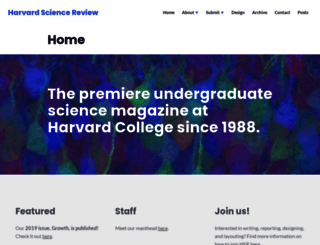Harvard Science Review – The undergraduate science publication of Harvard University since 1988, looking to bring cutting-edge research, central debat...
Page Load Speed
2.2 sec in total
First Response
10 ms
Resources Loaded
446 ms
Page Rendered
1.7 sec

About Website
Visit harvardsciencereview.org now to see the best up-to-date Harvard Science Review content and also check out these interesting facts you probably never knew about harvardsciencereview.org
The premiere undergraduate science magazine at Harvard College since 1988. Featured Our 2022-2023 issue, Beyond the Lines, is published! Check it out here. Staff Meet our masthead here. Join us! Inter...
Visit harvardsciencereview.orgKey Findings
We analyzed Harvardsciencereview.org page load time and found that the first response time was 10 ms and then it took 2.2 sec to load all DOM resources and completely render a web page. This is quite a good result, as only 45% of websites can load faster.